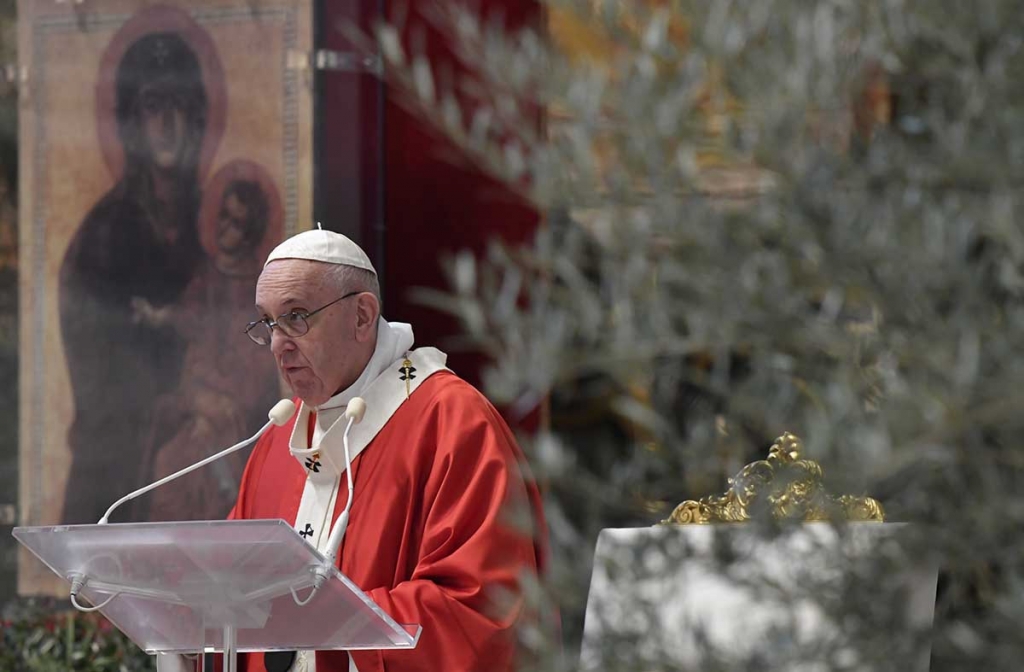Qurbanī (Arabic: قربانى), Qurban, or uḍḥiyyah (أضحية) as referred to in Islamic law, is the ritual animal sacrifice of a livestock animal during Eid al-Adha. The word is related to the Hebrew קרבן qorbān "offering" and Syriac qurbānā "sacrifice", etymologised through the cognate Arabic triliteral as "a way or means of approaching someone" or "nearness".[1] In Islamic law, udhiyyah would refer to the sacrifice of a specific animal, offered by a specific person, on specific days to seek God's pleasure and reward. The word qurban appears thrice in the Quran: once in reference to animal sacrifice and twice referring to sacrifice in the general sense of any act which may bring one closer to God. In contrast, dhabīḥah refers to normal Islamic slaughter outside the day of udhiyyah.
Islam traces the history of sacrifice back to Abel and Cain (Habil and Qabil), whose story is mentioned in the Qur'an.[2] Abel was the first human being to sacrifice an animal for God. Ibn Kathir narrates that Abel had offered a sheep whilst his brother Cain offered part of the crops of his land. The ordained procedure of God was that a fire would descend from the heavens and consume the accepted sacrifice. Accordingly, fire came down and enveloped the animal slaughtered by Abel thus accepting the sacrifice of Abel while Cain's sacrifice was rejected. This led to jealousy on the part of Cain resulting in the first human death when he murdered his brother Abel. After not seeking repentance for his actions, Cain was not forgiven by God.
The practice of qurbani can be traced back to [Ibrahim], who dreamt that God ordered him to sacrifice his most precious thing. Ibhrahim(swh) was in a dilemma as he couldn't determine what was his most precious thing. Then he realized it was his son's life. He had faith in God's command. He let his son know the purpose why he was taking his son out of their home. His son Ismail agreed to follow God's command, however, God intervened and informed him that his sacrifice had been accepted. And replaced his son with a sheep. This replacement seems to point to either the religious institutionalisation of sacrifice itself, or to the future self-sacrifices of the Islamic prophet Muhammad and his companions (who were destined to emerge from the progeny of Ishmael) in the cause of their faith. From that day onward, every Eid al-Adha once a year, Muslims around the world slaughter an animal to commemorate Ibrahim's sacrifice and to remind themselves of abnegation.
The philosophy behind udhiyyah is that it is a demonstration of submission to God, complete obedience to God's will or command and sacrificing everything for his pleasure. Ibrahim demonstrated this spirit of submission and sacrifice in the best possible manner. When confronted with the challenge of love and allegiance, he chose to submit unconditionally to God and suppressed personal desire and love for his family and child. Qurbani calls for the slaughter of one's innate desires by placing the knife of courage and resistance on hatred, jealousy, pride, greed, animosity, love for the world and other such maladies of the heart.
In Islam, the sacrifice of an animal is legal from the morning of the 10th to the sunset of the 13th Dhu l-Hijjah, the 12th lunar month of the Islamic calendar. On these days Muslims all over the world offer Qurbani which means a sacrifice/ slaughter of an animal on specific days.It is understood as a symbolic repetition of Ibrahim's sacrifice of a ram in place of his son, a crucial notion in Judaism, and Islam alike. Islamic preachers would use the occasion to comment on the fact that Islam is a religion of sacrifice and use this opportunity to remind Muslims of their duty of serving mankind with their time, effort and wealth.
Most schools of fiqh accept that the animal must be slaughtered according to the laws of dhabihah and that the animal in question must be a domesticated goat, sheep, cow or camel.
Animal sacrifices at the Eid al-Adha Islamic festival in Pakistan and animals collected for the Hajj sacrifice in Mecca, Saudi Arabia, an obligatory ritual.
Muslims engaged in the Hajj (pilgrimage) are obliged to sacrifice a lamb or a goat or join others in sacrificing a cow or a camel during the celebration of the Eid al-Adha,[8][9] an Arabic term that means "Feast of Sacrifice", also known as al-Id al-Kabir (Great Feast), or Qurban Bayrami (Sacrifice Feast) in Turkic influenced cultures, Bakar Id (Goat Feast) in Indian subcontinent and Reraya Qurben in Indonesia.[7] Other Muslims not on the Hajj to Mecca also participate in this sacrifice wherever they are, on the 10th day of the 12th lunar month in the Islamic calendar.[7] It is understood as a symbolic re-enactment of Ibrahim's sacrifice of a ram in place of his son. Meat from this occasion is divided into three parts, one part is kept by the sacrificing family for food, the other gifted to friends and family, and the third given to the poor Muslims. The sacrificed animal is a sheep, goat, cow or camel.[7][10] The animal sacrifice, states Philip Stewart, is not required by the Quran, but is based on interpretations of other Islamic texts.
The Eid al-Adha is major annual festival of animal sacrifice in Islam. In Indonesia alone, for example, some 800,000 animals were sacrificed in 2014 by its Muslims on the festival, but the number can be a bit lower or higher depending on the economic conditions.[12] According to Lesley Hazleton, in Turkey about 2,500,000 sheep, cows and goats are sacrificed each year to observe the Islamic festival of animal sacrifice, with a part of the sacrificed animal given to the needy who didn't sacrifice an animal.[13] According to The Independent, nearly 10,000,000 animals are sacrificed in Pakistan every year on Eid.[14][15] Millions of animal are brought into the Middle East from north Africa and parts of Asia and killed every year on Eid al-Adha.[16]
Other occasions when Muslims perform animal sacrifice include the 'aqiqa, when a child is seven days old, is shaved and given a name. It is believed that the animal sacrifice binds the child to Islam and offers protection to the child from evil.
Allah (/ˈælə, ˈɑːlə, əlˈlɑː/;[1][2] Arabic: ٱللَّٰه, romanized: Allāh, IPA: [ɑɫˈɫɑː(h)] (listen)) is the Arabic word for God in Abrahamic religions. In the English language, the word generally refers to God in Islam.[3][4][5] The word is thought to be derived by contraction from al-ilāh, which means "the god", and is related to El and Elah, the Hebrew and Aramaic words for God.[6][7]
The word Allah has been used by Arabic people of different religions since pre-Islamic times.[8] More specifically, it has been used as a term for God by Muslims (both Arab and non-Arab) and Arab Christians.[9] It is also often, albeit not exclusively, used in this way by Bábists, Bahá'ís, Mandaeans, Indonesian and Maltese Christians, and Mizrahi Jews.[10][11][12][13] Similar usage by Christians and Sikhs in West Malaysia has recently led to political and legal controversies.





